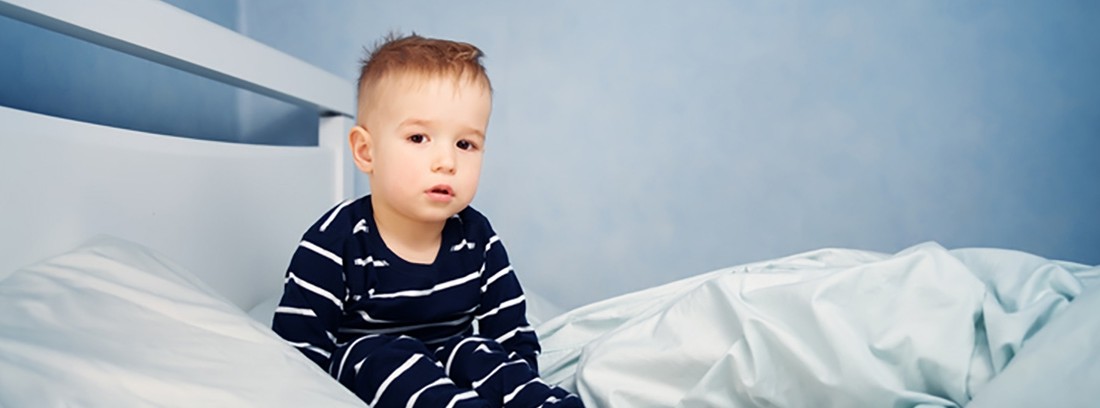Enuresis

Enuresis is involuntary urination at an age when the child should control urine. If the child just lacks urination control in the evening It is called nocturnal enuresis: the child wets the bed almost daily but during the day can control the pee. If the child does not control urination during the day it is called: daytime enuresis. Enuresis is called primary when there was never urine control and secondary, when control was achieved for more than 3-6 months and was lost.
Cause
The most common cause of enuresis in childhood is primary nocturnal enuresis. It is the one that will be dealt with at length in this section. The toilet training at nightIn children, it is highly variable and there is a not inconsiderable percentage (15-20%) who wet the bed until they are 5 or 6 years old. It is a more frequent situation in boys than in girls.
In most cases the problem resolves spontaneously, without specific treatment, only with the maturity of the child. Most children do not have an organic cause to justify "peeing" in bed. There is usually a family trend: the father, mother or a brother may have suffered the same problem in their childhood.
One of the possible causes of this urinary incontinence is that sleep is so deep at night that the child is unable to feel the sensation of having a full bladder. Another cause is that the child has a smaller bladder than normal or that they have a low production of antidiuretic hormone at night. The role of antidiuretic hormone is to decrease urine output. Under normal conditions, more hormone is produced at night than during the day.
Less frequently, bed-wetting is due to other more serious health problems (such as diabetes or neurological problems), urinary tract infections, or emotional problems (school, family, jealousy).
Symptoms
It can be considered normal for a child to wet the bed up to six years of age. If nocturnal enuresis is a fact in the child do not get angry or punish the child if he wets the bed. It is a source of shame for him and he must be informed that many children like him have this problem.
The Pediatrician should be consulted if:
- The child is older than six or seven years
- If the enuresis has started abruptly after months of control
- If the urine smells bad or has an abnormal color
- If the child hurts when urinating
- If the child urinates much more than normal and is accompanied by great thirst or weight loss
- If you do not control defecation at the same time
- If urine is emitted little by little but continuously or it comes out through the anus or vagina
Treatment
If the Pediatrician has not detected any disease that justifies urinary incontinence at night, treatments without drugs and with drugs can be used. Many times, the passage of time and the maturation of the child put an end to the problem. Only 1% of cases remain incontinent in adolescence. The best time to starting treatment is in children older than six years who are aware of their problem and want to remedy it.
Behavioral treatment:
Without medicine, you can help keep your child from wetting the bed with or without medicine. It can be solved up to 50% of the cases. Try to get the child drink little fluids before going to bed (Try to limit fluid intake from snack time but encourage lots of fluids the rest of the day). Carry out bladder exercises: try to hold the pee in the bladder as long as possible and try to cut off urination several times while urinating). In this way, an attempt is made to increase your bladder capacity and make you aware of bladder sphincter control.
The child should pee before going to sleep. A waterproof mattress protector, under the bottom sheet; It must be held firmly to avoid the risk of suffocation. If the child is older, you should help with the change of sheets if the bed has dawned wet. It is not a punishment, just a way of making the child aware of the situation. If the child is already aware of what is happening and is motivated to remedy, the strategy of calendars where wet and dry days are recorded can be used to see progress. A prize must be negotiated jointly with the child if the goal is achieved. It should not be something material or that costs a lot of money, the best thing is to do a family activity that you like a lot: excursion, going to the zoo, theater, cinema or going to sleep at a friend's house.
Waking the child in the middle of the night to take him to the bathroom doesn't do much good., since the child does not feel the need to urinate on his own and usually relapses when he is no longer awake. There are devices that have an alarm or buzzer, so that when the child starts urinating at night they produce a buzzing, sound or vibration that wakes him up and makes him aware that he is peeing. It appears to be effective in up to 70% of cases.
Drug treatment
They are basically commercial preparations of Antidiuretic hormone (ADH) that are given before bedtime. Before it was used in the form of an intranasal spray but currently it has been proven that it is not safe and it is used in the form of flash tablets (which dissolve in the mouth in a few seconds). It should always be prescribed by the Pediatrician and should closely monitor the patient to assess possible side effects.
In addition to medicines, are very important behavioral measures previously cited. If there are doubts about the function of the urinary tract, the urologist should be consulted.
(Updated at Apr 15 / 2024)